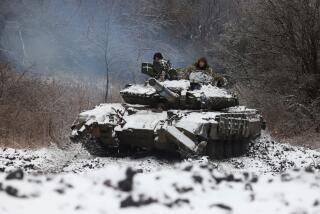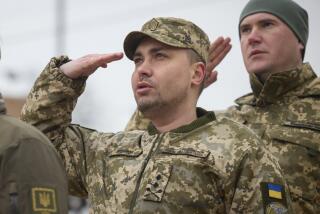Ukrainian Poisoning Confirmed
VIENNA — Ukrainian presidential hopeful Viktor Yushchenko was poisoned with dioxin, most likely intentionally, doctors in Vienna who had been struggling to diagnose his mystery illness confirmed Saturday.
Yushchenko, a pro-Western opposition leader, has alleged since suddenly falling ill in September that he was poisoned in an attempt to kill a key critic of Ukraine’s government. Authorities have denied the charge, and some government supporters have ridiculed it.
Michael Zimpfer, director of the private Rudolfinerhaus clinic that has been treating Yushchenko, said tests concluded in the last 24 hours proved that dioxin caused the illness that had disfigured the Ukrainian candidate’s face.
“There is no doubt about the fact that Mr. Yushchenko’s disease has been caused by dioxin poisoning,” he told reporters at a news conference at the clinic.
He said the doctors “suspect the involvement of an external party” and that the dioxin had been given orally. “The criminal investigation does not fall within our purview,” he added.
The diagnosis was based on clinical observations, skin changes and findings from tissue and blood samples, he said.
Asked whether he had reported his findings to the Ukrainian authorities, Zimpfer replied that Austrian justice officials had been in contact with Ukraine since Yushchenko’s second hospitalization in late September.
The candidate fell sick Sept. 6, a day after having late-night food and drinks with the head of the Security Service of Ukraine, among others.
Yushchenko’s wife, Kateryna Chumachenko, said she noticed a strange taste on his lips when she kissed him that night. “I tasted some medicine on his breath, on his lips,” she said in an interview on ABC’s “Good Morning America.” “And I asked him about it. He brushed it away, saying there is nothing.”
Yushchenko’s illness affected several internal organs and caused severe back pain, his doctors say. The most visible symptom has been pockmarks, cysts and darkened areas on his face. In recent weeks, medical experts in various countries have said the facial condition appeared to be chloracne, which is associated with dioxin poisoning.
The allegation of attempted murder, now backed by fresh medical evidence, could affect a repeat presidential runoff election that pits Yushchenko against Prime Minister Viktor Yanukovich on Dec. 26. The revote was set after the Supreme Court ruled the Nov. 21 balloting, narrowly won by Yanukovich, invalid because of fraud.
Yushchenko supporters, however, already believed that he had been poisoned, and it was not immediately clear how many Yanukovich backers would be willing to believe the Vienna doctors.
Some in the opposition camp were skeptical that the Dec. 26 balloting would take place. Saturday’s announcement potentially raised the stakes by increasing the possibility that if the poisoning were an assassination attempt, those responsible might be caught and punished under a Yushchenko presidency.
“I don’t want all of us to have the impression that the Yanukovich campaign and Yanukovich himself have relaxed and stopped fighting,” Yulia Tymoshenko, a key opposition leader, said Saturday at a news conference in Kiev, the capital. “They will try everything for the presidential elections not to happen, or not to have a result.”
Under Ukrainian law, if a presidential election is so flawed that it is impossible to determine the result, the incumbent can remain in power while new balloting is organized.
Speaking in the eastern city of Luhansk before the Vienna announcement, Yanukovich expressed sympathy for Yushchenko.
“He really is a sick person,” Yanukovich said in televised remarks. “I had a little talk with him concerning this topic. I’m sorry for him as a person. I wish him to get well soon. As for the reasons, I know nothing. Let the specialists work on that.”
Yanukovich’s campaign manager, Taras Chornovil, has rejected any possibility that the prime minister was involved in the alleged poisoning. There is “no logic in such an accusation,” Chornovil said.
Yushchenko first checked into the Vienna clinic Sept. 10, four days after falling ill, Zimpfer said. The effects of dioxin poisoning are swift because the substance is rapidly absorbed by the body, Zimpfer said. Samples of Yushchenko’s blood and tissue taken in September were recently tested for dioxin, and the results indicated that the levels of the substance were at least 1,000 times higher than normal, which Zimpfer said would have required a dose of just milligrams.
“It would have been easy to put it in a cream soup, for example,” he said.
Zimpfer said that Yushchenko’s dioxin levels had returned to normal and that he would probably leave the clinic today or Monday.
Zimpfer said the doctors did not know for sure whether Yushchenko had been poisoned by just one substance or by a combination of substances.
“It is possible that we only found the dioxin,” he said. Damage to the digestive system suggested that the poison had been ingested orally, he said.
In an Oct. 7 statement to Ukraine’s parliament, Volodymyr Sivkovych, chairman of an ad hoc commission that looked into Yushchenko’s illness, reported on the opposition leader’s activities the day before he became ill. On the evening of Sept. 5, Yushchenko had dinner at the summer house of a businessman, where sushi was served that had not been refrigerated for more than three hours, Sivkovych said. From late that evening until 2:00 a.m. the next day, “Yushchenko was visiting the summer house of Volodymyr Satsyuk, the first deputy chairman of the Security Service of Ukraine,” he said. The security service head, Ihor Smeshko, was also present, he said.
The commission understood that this meeting was held at the request of a Yushchenko associate, he said.
“Food was served on common plates, and drinks were served ... from bottles that were uncorked in the presence of the company,” Sivkovych reported. “Yushchenko started to complain of splitting headaches early on Sept. 6.”
Yushchenko outlined his allegations of an attempted assassination in a Sept. 21 speech to parliament.
“Friends, this is not a problem of cuisine as such,” Yushchenko said then. “We are talking about a Ukrainian political kitchen, where assassinations are ordered!”
Yushchenko cited the suspicious deaths of several prominent figures, including Vyacheslav Chornovil, a former presidential candidate who died in a traffic accident several years ago.
“In 1999, Vyacheslav Chornovil was here alive,” he said. “We pretend we don’t know who killed him with a Kamaz truck. In 2000, [campaigning journalist] Georgi Gongadze was sitting on the balcony over there and writing political reports. Who cut his head off? Well, we don’t seem to know, although one prosecutor said once that the killer has already been found, and that his surname begins with the letter K. He wasn’t brave enough to give us a few more letters.”
Gongadze’s death has been the darkest shadow trailing Ukrainian President Leonid D. Kuchma.
Tapes purportedly recorded secretly by a former Kuchma bodyguard reveal that the president complained repeatedly about Gongadze to his former interior minister, Yuri Kravchenko. Gongadze disappeared the night of Sept. 16, 2000. His body was found, but not the head.
A former police officer, Ihor Honcharov, said last year that he had information that police working with a criminal gang had abducted the journalist on orders from Kravchenko, who had been following orders from Kuchma.
Honcharov had been arrested on charges of being a member of a rogue police gang that had been involved in contract killing. He died in prison last August. The prosecutor general’s office said he died of spinal trauma as a result of being beaten.
Yushchenko has said that if he is elected president, prosecutors will investigate the death of Gongadze and other high-profile criminal cases.
Zimpfer said at Saturday’s news conference that Yushchenko was “in critical condition but not on the verge of dying” when he first arrived at the hospital in September. However, the dose could have been fatal if doctors hadn’t halted the poison’s attack on his liver and pancreas.
Nikolai Korpan, the doctor who oversaw Yushchenko’s treatment, said no “functional damage” would remain as a result of the dioxin exposure. However, the doctors said Yushchenko’s facial disfigurement would remain for a long time as follow-up treatments continue.
*
(BEGIN TEXT OF INFOBOX)
Politician’s illness
Doctors report that dioxin poison caused the mysterious illness of Ukrainian presidential candidate Viktor Yushchenko. He fell ill in September. Recent tests showed he had dioxin levels 1,000 times above normal.
What are dioxins?
They are byproducts from waste incineration, chemical and pesticide manufacturing and pulp and paper bleaching.
What are the effects?
Severe exposure - Chloracne is a skin disease with acne-like lesions on the face and upper body and may take two to three years to heal. It increases the risk of cancer and liver damage.
Low levels - Exposure over long periods may result in reproductive, developmental, hormonal and immunological damage.
Where are they found?
Nearly everywhere, in the atmosphere, soil, rivers and the food chain.
What is a safe level of exposure?
After studies in the 1990s, the World Health Organization set a daily safe exposure rate of one to four picograms. A picogram is one-trillionth of a gram.
**
Months of mystery
Sept. 10: Yushchenko taken to Rudolfinerhaus clinic in Vienna.
Sept. 21: Tells parliament he has fallen victim to “Ukraine’s political kitchen.”
Sept. 30: He returns to Rudolfinerhaus.
Oct. 31: First round of voting in presidential election.
Nov. 21: Second round of presidential voting.
Dec. 10: He goes to clinic for third time; tests provide evidence of poisoning.
Dec. 11: Doctors declare Yushchenko was poisoned.
*
Sources: Environmental Protection Agency; Associated Press; BBC
*
Holley reported from Kiev and Yee from Vienna.
More to Read
Sign up for Essential California
The most important California stories and recommendations in your inbox every morning.
You may occasionally receive promotional content from the Los Angeles Times.










